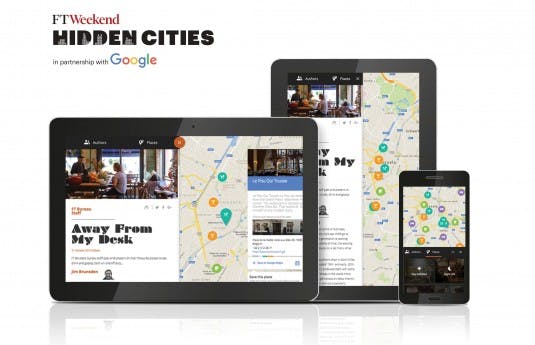
Today, the Financial Times and Google announce Hidden Cities. Utilising Google technology and the unparalleled global knowledge of FT Weekend journalists, Hidden Cities helps readers discover fresh perspectives on some of Europe’s cultural and political capitals. The collaboration launches on October 31 in Brussels, followed by London on November 28.
Visitors to the Hidden Cities site will be able to see recommendations for restaurants, bars, museums, and more, compiled both by FT correspondents who’ve lived and worked in a city, as well as local experts and cultural figures. For Brussels, these include an introduction from FT Brussels bureau chief Peter Spiegel, FT editor Lionel Barber, Paul Dujardin (Director, Bozar), Alain Coumont (owner, Le Pain Quotidien), Ali Amar (writer), Jean van Roy (head brewer at Brasserie Cantillon), and Martine Reicherts (Director-General for Education and Culture, European Commission).
Hidden Cities will be brought to life through an interactive, mobile and desktop Google Maps experience where readers will have access to an enriched map of locations populated with recommendations from FT journalists and local cultural experts.Visitors can save recommendations on their own Google Maps app, straight from the articles, and filter the map based on time of day and activity of interest. The Hidden Cities site will be an ongoing resource, available perpetually online on desktop and mobile. Readers will also be able to discover Hidden Cities in a print supplement published in FT Weekend Magazine on October 31.
“As a digital first global news organisation, we are always on the hunt for new, dynamic ways to tell stories and create rich experiences for our audience,” said FT editor Lionel Barber. “Hidden Cities delivers a digital treasure map to be enjoyed in real life, backed by the FT’s award-winning journalism and Google’s leading technology. A powerful combination.”
“For years, Europeans have used Google Maps to find and discover new places, from restaurants and museums to historic landmarks and concert halls. This partnership builds on our mutual strengths: Google’s technology, combined with the FT’s editorial depth. It’s a good example of how technology and journalism can work together to help people discover Europe’s hidden gems,” said Carlo D’Asaro Biondo, Google’s president for strategic partnerships in Europe.
- Ends -
About the Financial Times
The Financial Times, one of the world’s leading business news organisations, is recognised internationally for its authority, integrity and accuracy. Providing essential news, comment, data and analysis for the global business community, the FT has a combined paid print and digital circulation of 747,000. Mobile is an increasingly important channel for the FT, driving almost half of total traffic.